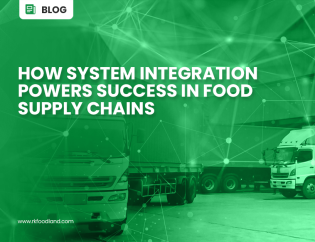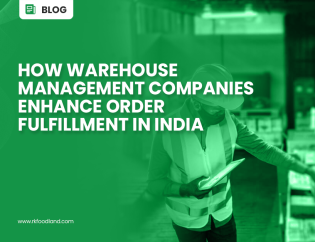
Highlighting a few top practices in inventory management, here is a list of techniques that help you optimize the food supply chain.
[Avg. read time < 4 mins.]
Demand Forecasting
One of the primary challenges in food supply chain management is predicting consumer demand accurately. Effective demand forecasting helps reduce wastage and ensure a consistent supply of food products. Supply chain companies in India incorporate sophisticated data analytics tools to analyse historical data, market trends, and external factors, including seasonality and economic conditions, to make informed decisions. By anticipating demand fluctuations, it becomes possible for the companies to optimize inventory levels and reduce the risk of overstocking or understocking.
First In, First Out Rotation
In a food supply chain management operation, especially with perishable goods, products have limited shelf lives. As an impactful technique, FIFO rotation works like a key inventory management practice for ensuring that the oldest inventory is used or sold first. This principle is crucial in maintaining product freshness and reducing the risk of spoilage. Food supply chain companies implement this as an efficient management system along with employing trained staff to ensure proper inventory rotation, minimizing waste, and maximizing product quality.
Supplier Collaboration
Collaboration with different vendor parties, including suppliers, is crucial in the food supply chain. Establishing strong relationships with reliable suppliers helps ensure a steady and consistent flow of inventory. Collaborating closely with suppliers benefits supply chain companies in India with timely deliveries, competitive pricing, and the assurance of product quality. Real-time communication and information sharing with suppliers enable quick adjustments to inventory levels based on market demand.
Just-in-Time Inventory
JIT Inventory management is a well-established practice implemented in the food supply chain management process. This practice involves receiving goods and raw materials just in time for production or distribution, minimizing the need for excessive storage. While JIT reduces storage costs and minimizes the risk of food spoilage, it requires precise coordination and communication with the vendors. To implement JIT effectively, it is important for the food supply chain companies to maintain a robust supplier network, employ agile logistics and ensure strategic end-to-end fulfilment.
Technology Integration
While technology advances with every gust of mind, integrating software and digital tools is essential for efficient inventory management in the food supply chain. Top food supply chain management in India leverages cutting-edge technology, primarily to monitor inventory levels and movement in real-time. These innovative tools help with accurate data and analytics for better decision-making. Technology also helps in maintaining traceability, ideal for food safety and quality control.
Quality Control and Compliance
Maintaining strict quality control and complying with food safety regulations is non-negotiable in the food supply chain management. Thus, to ensure that all the products meet safety and quality standards, top supply chain management companies invest in quality assurance and compliance management tools for stock and inventory. This includes regular inspections, temperature monitoring, and documentation. By upholding high-quality standards and adhering to regulations, it becomes possible to build trust among the clientele and avoid costly recalls or legal issues.
Regular Audits and Continuous Improvement
Continuous improvement is a fundamental principle of effective inventory management. Food supply chain companies in India regularly conduct audits to evaluate and optimize their inventory management processes. These audits assess various aspects, including inventory accuracy, order fulfilment rates, and waste reduction. By identifying areas for improvement, it becomes possible to redefine inventory management practices, reduce costs, and enhance overall efficiency. This ongoing commitment to improvement is essential for staying competitive in the food supply chain.
How RK Foodland helps with best inventory management practices and optimize your food supply chain?
These practices are effective and are vital components of a comprehensive inventory management strategy in the food supply chain. As one of the top supply chain management companies, RK Foodland leverages its expertise and years of experience to help optimize food supply chains effectively. With strategic consultation, planning, and forecasting, experts at RK Foodland implement the best inventory management practices like.
Technical Integration for Real-Time Inventory Control
RK Foodland integrates state-of-the-art inventory management practices that help with real-time monitoring of inventory levels and movement, enhancing visibility and control. By using these practices, it becomes possible to optimize the food supply chain with data-driven decisions, improved traceability, and the highest level of efficiency in inventory management.
Establishing a Strong and Efficient Network
Leveraging extensive network establishment, RK Foodland assures effective end-to-end integration for efficient fulfilment. By bridging between the first point and the final consumer, RK Foodland helps ensure a consistent flow of inventory throughout the supply chain management. This helps with winning an edge in the curve, including competitive pricing, timely deliveries, and superior product quality. This collaborative approach also helps in maintaining a reliable and responsive supply chain.
Reliable Quality Assurance and Compliance
As one of the top food supply chain management companies, RK Foodland helps establish a robust quality assurance and compliance management structure to ensure that it meets strict quality and safety standards. The supply chain management consultants and experts at RK Foodland help with conducting regular inspections, monitoring temperature and storage conditions, and managing documentation to guarantee that all the food products adhere to regulatory requirements. This commitment to quality control helps reduce the risk of product recall and fosters consumer trust.
Encourages Constant Improvement
RK Foodland encourages a culture of continuous improvement within their clients’ organizations. By conducting regular audits and performance evaluations, we at RK Foodland help identify areas for enhancement in inventory management. This proactive approach enables clients to refine the processes, reduce costs, and enhance overall efficiency. Implementing years of experience and expertise, RK Foodland assures of driving significant improvements in the food supply chain management.
Optimise Your Food Supply Chain with Top Inventory Management Practices
The importance of top practices in inventory management cannot be overlooked as it lays the foundation for an effective end-to-end integration. While every aspect of a food supply chain plays a prominent role in determining overall efficiency, inventory management is one of the most crucial aspects with massive significance. Revolutionize your food supply chain management with RK Foodland, and rest assured of effective strategies and results. Partner with RK Foodland for a more efficient and resilient food supply chain.









